A simple motto, used countless times on American TV commercials, 'built to last' is a phrase that somehow doesn't apply here in China any more. So focused on growth and development, the quality of the growth seems secondary sometimes to the speed and appearance of growth. Things age quickly in China.
It seems strange that in this country famous for a Great Wall built around 2000 years ago durability has become passe. The technology, the buildings, the cars, nothing is made with thoughts of longevity. A thirty year old building in America is newer than a five year old building in Shanghai. It's not that people don't maintain things, there is a service army bigger than a military regiment, but rather that they don't construct for the future - they construct for the now. Everywhere I go I feel like I'm in a cheap imitation of a building in China, until I realize that I am in a building in China and most are simply cheaply made, everything is superficial.
I was told that people in the country care more for durability than city folk, which I'm sure must be true. Fashion becomes a low priority when winter's warmth factors into the equation, just look at the hoodies, jeans and boots of Boston for example. In the country quality matters because people are poor and things need to last. In the country the great leap forward, the real one with tangible economic benefit, hasn't quite reached everyone yet.
In the city, though, the lure of modernization dazzles everyone's eyes. The scores of buildings are nothing more than plaster over cement blocks - no wood, no insulation, no central heating. Someday these buildings will all be too old to support people, to support themselves, and they will need to come down. Will we one day hear of great turnover in Shanghai's skyline? Unlikely, and I don't mean to suggest these buildings will topple on their own, rather they will slowly and slowly sink back to being crowded, unkept lodgings for the underprivileged. Yet the images of the rescue workers in Sichuan after the earthquake bending the rebar of collapsed grade schools with their bare hands serves as a hollow reminder of the worst that can happen from cutting corners.
I can't help but wonder what happens when everything gets old. Will it the city become a tragic tale of boom developments, like so many ghost towns in Alaska? Or will the city continue to grow, to adapt and learn to build lasting structures? I can't help they figure it out soon, because soon there won't be enough land anymore anyway.
Wednesday, July 30, 2008
Tuesday, July 29, 2008
Worth the Burn
The President has Camp David, Nero had his fiddle and I have Mandarin City. I have found the only my first, and as of yet only, peaceful retreat in Shanghai. Located miles from any subway stop in the western part of the city, this expat haven is as close to heaven as I've seen in Shanghai. For a few yuan I can spend a day relaxing book in hand and sunglasses on at the side of a large crystal clear pool.
The western part of Shanghai is where all the 'wealthy' foreigners live with their nannies and business-paid housing and private drivers. This is a foreigners' Shanghai I'll never see, aside from beautiful Monday afternoons at their pool, which is open to the public. The apartment buildings are lined with faux-Greek statues and assorted Cherubs with baroque styling growing like vines up the sides. There are restaurants and hotels, security and gates - for all purposes it feels like someone picked up a gated community in Arizona, moved it halfway around the world and dropped it there just the same as it had been. Normally I live in mortal fear of the synthetic worlds of these gated communities, but after 7 months of anything but calculated ease and aesthetics it's more than a welcome diversion.
A large rounded pool, not designed for laps but big enough to do so, surrounded by sun umbrellas and lounge chairs on a sunny day makes you forget all the noise and dirt located just a few miles away. The pool bar serves cheap fried food and drinks all day, so there is no need to leave. Every time I think about why the place seems so wonderful I arrive at nothing earth shattering that we don't have back home, but maybe that's just it... there is nothing we don't have back home there! My trip there this weekend was one of the few times I entered a place where I could forget I was in China. In a country so crowded, so noisy, so constantly in flux, it's rare to find a peaceful place without boarding a plane. I even got a sunburn. It's my first in China and I don't even mind, it's just another reminder of home.
The western part of Shanghai is where all the 'wealthy' foreigners live with their nannies and business-paid housing and private drivers. This is a foreigners' Shanghai I'll never see, aside from beautiful Monday afternoons at their pool, which is open to the public. The apartment buildings are lined with faux-Greek statues and assorted Cherubs with baroque styling growing like vines up the sides. There are restaurants and hotels, security and gates - for all purposes it feels like someone picked up a gated community in Arizona, moved it halfway around the world and dropped it there just the same as it had been. Normally I live in mortal fear of the synthetic worlds of these gated communities, but after 7 months of anything but calculated ease and aesthetics it's more than a welcome diversion.
A large rounded pool, not designed for laps but big enough to do so, surrounded by sun umbrellas and lounge chairs on a sunny day makes you forget all the noise and dirt located just a few miles away. The pool bar serves cheap fried food and drinks all day, so there is no need to leave. Every time I think about why the place seems so wonderful I arrive at nothing earth shattering that we don't have back home, but maybe that's just it... there is nothing we don't have back home there! My trip there this weekend was one of the few times I entered a place where I could forget I was in China. In a country so crowded, so noisy, so constantly in flux, it's rare to find a peaceful place without boarding a plane. I even got a sunburn. It's my first in China and I don't even mind, it's just another reminder of home.
Wednesday, July 23, 2008
Home Cookin'
Recently, after months of enjoying the most authentic Chinese food anyone could ever ask for, I have begun to strike back against the all ethnic diet and return to the bountiful goodness of western food. This revolution was started by a few visits to a few trendy western style restaurants that have cropped up in Shanghai. Using my weekends to relax and revert back to familiar norms, I have surrounded myself with like minded friends who also enjoy the subtle delicacies we used to enjoy at home.
As westerners become more prevalent in Shanghai, so do these restaurants, specializing in delicious and authentic Italian, Greek and French food. I finally found authentic pizza, large Mediterranean style salads (made from fresh, clean vegetables) and most importantly a restaurant so devoted to serving the best chocolate, it would be famous even in Switzerland. I cannot lie, ordering an iced chocolate drink there will make you swear its the greatest thing you've ever tasted until you try the chocolate cake and forget your dinky milkshake.
Its simply a relief to find food that I am not only familiar with when I order, but really enjoy. Chinese food is great, but just like sunny days leave sunburns there can be too much of a good thing.
As westerners become more prevalent in Shanghai, so do these restaurants, specializing in delicious and authentic Italian, Greek and French food. I finally found authentic pizza, large Mediterranean style salads (made from fresh, clean vegetables) and most importantly a restaurant so devoted to serving the best chocolate, it would be famous even in Switzerland. I cannot lie, ordering an iced chocolate drink there will make you swear its the greatest thing you've ever tasted until you try the chocolate cake and forget your dinky milkshake.
Its simply a relief to find food that I am not only familiar with when I order, but really enjoy. Chinese food is great, but just like sunny days leave sunburns there can be too much of a good thing.
Tuesday, July 22, 2008
Western Peace
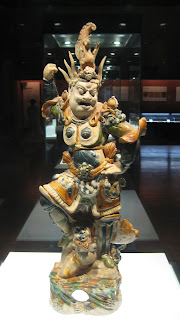 Xi'an, or Western Peace as it translates into English, may be the most historical city in all of China outside Beijing. Home to numerous dynasties, the city wall still encompasses the old city (except for the part where the modern government decided to knock it down to build the train station, a decision they now regret and are rebuilding the wall). The city embraces its history and holds more ties to the past than any other city I've visited in China so far.
Xi'an, or Western Peace as it translates into English, may be the most historical city in all of China outside Beijing. Home to numerous dynasties, the city wall still encompasses the old city (except for the part where the modern government decided to knock it down to build the train station, a decision they now regret and are rebuilding the wall). The city embraces its history and holds more ties to the past than any other city I've visited in China so far.Biking around the wall with my family was the non-terracotta warrior highlight of Xi'an. The weather was too hot to bike, but thankfully being that high up allowed a slight breeze to sweep some of the dry plateau heat away. The roofs of the city, though thoroughly modern I'm sure, aimed to feel old, and coupled with the red lanterns hanging from every lamp post I couldn't help
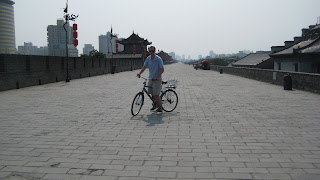 but laugh thinking of what the grunt workers who built this fortification would say if they knew it was now used for foreign tourists to bike along.
but laugh thinking of what the grunt workers who built this fortification would say if they knew it was now used for foreign tourists to bike along.At night, just outside the south gate, we encountered a community dancing festival. I'll never explain it correctly, except saying it was magical, as anyone could join in a group, snaking line dance complete with drums, and cymbals. The leaders carried and danced with umbrellas in the humid evening air and anyone and everyone (I even saw some other foreigners in the lines) snaked along, do-si-doing and having a great time. Though none of us joined in, we sat mesmerized for the better part of an hour watching the people of Xi'an have a swinging night out.
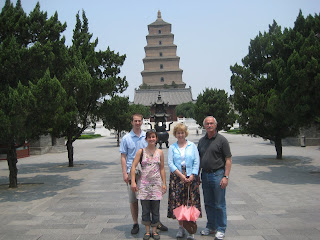 Among the other key sights were the museum, stocked with fascinating bronzes and other art from yesteryear, the Buddhist Pagoda and the Bell Tower, which we stayed near. The pagoda is apparently famously leaning, some compare it to that in Pisa, but the former's solid brick facade lacks the delicate beauty beauty of the later's delicate marble archways. The museum's bronze collection impressed me more than the collection of our famed Shanghai Museum, yet overall is no match for Shanghai's variety. The Bell Tower, and cousin Drum Tower, were beautiful central points to the city. Set on an axis with views down sweeping boulevards to each of the four gates, the Bell Tower is the heart of the city, oozing more cultural history than anything in Shanghai.
Among the other key sights were the museum, stocked with fascinating bronzes and other art from yesteryear, the Buddhist Pagoda and the Bell Tower, which we stayed near. The pagoda is apparently famously leaning, some compare it to that in Pisa, but the former's solid brick facade lacks the delicate beauty beauty of the later's delicate marble archways. The museum's bronze collection impressed me more than the collection of our famed Shanghai Museum, yet overall is no match for Shanghai's variety. The Bell Tower, and cousin Drum Tower, were beautiful central points to the city. Set on an axis with views down sweeping boulevards to each of the four gates, the Bell Tower is the heart of the city, oozing more cultural history than anything in Shanghai.A beautiful city, a historical city, Xi'an is a city which cares for itself better than most cities I've seen in China. Blessed with a central location in China, it's witnessed more historical activity than most cities, but despite its history and population (of 8 million) it doesn't feel big. Perhaps it's because I live in Shanghai now, but perhaps it's because it, like my hometown, is proud of its history.
Friday, July 18, 2008
Self Appointed 8th Wonder of the World
The second half of my family's visit to China consisted of a visit to the ancient city of Xi'an. Most famous for the presence of the Terracotta Warriors, Xi'an was also the capital city for numerous empires. Still completely enclosed by ancient walls, the city has a much older much more 'Chinese' feel than Shanghai. And it's really hot.
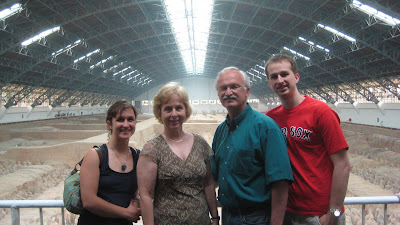 The Terracotta Warriors are no doubt impressive, yet their self billing as 'the 8th wonder of the world' seems a bit much. Seemingly located inside an airplane hanger, the excavations are going slow and there is still much work to be done at the sight, so now only a few hundred of the thousand of soldiers have been restored. Once they finish the restoration of all the solders, the sight will be truly remarkable, but for now they have only uncovered about one end zone worth of a football field of statues.
The Terracotta Warriors are no doubt impressive, yet their self billing as 'the 8th wonder of the world' seems a bit much. Seemingly located inside an airplane hanger, the excavations are going slow and there is still much work to be done at the sight, so now only a few hundred of the thousand of soldiers have been restored. Once they finish the restoration of all the solders, the sight will be truly remarkable, but for now they have only uncovered about one end zone worth of a football field of statues.
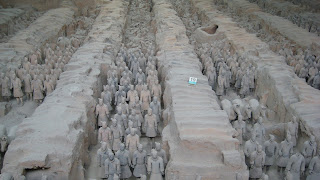
The warrior pits contain different types of soldiers, ranging from foot soldiers to generals, archers to charioteers. Formerly standing in regimental rows, the shattered remains of fire and pillage have reduced the findings to fragments of clay which must be painstakingly restored. Like most classical art they were at one point dazzlingly colored, but almost all the color has come off.
We got to meet one of the men who rediscovered the warriors in the 1970's. I felt sad for him, as this simple farmer is now chained to a desk and forced to sign books for tourists like my mom and dad. I hope the government compensates him fairly, because I doubt he had much choice in the matter.
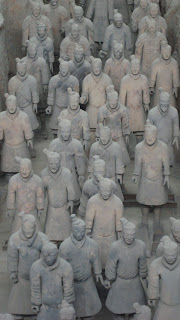 One humorous rumor I heard from a tour guide friend here in Shanghai is that the entire sight is fake. In 1972, after China had destroyed all its cultural relics, the government realized it might have gone too far and decided to cook up an archaeological sight. Easier to do when the country has been sealed off to foreigners and all the craftsmen of the country have been locked up. I don't believe its true, but its a funny thought.
One humorous rumor I heard from a tour guide friend here in Shanghai is that the entire sight is fake. In 1972, after China had destroyed all its cultural relics, the government realized it might have gone too far and decided to cook up an archaeological sight. Easier to do when the country has been sealed off to foreigners and all the craftsmen of the country have been locked up. I don't believe its true, but its a funny thought.
There is no doubt the warriors are impressive, if only because there are so many and they are so old. Once the restoration is finished it will only become more impressive, perhaps earning its self given nickname.
 The Terracotta Warriors are no doubt impressive, yet their self billing as 'the 8th wonder of the world' seems a bit much. Seemingly located inside an airplane hanger, the excavations are going slow and there is still much work to be done at the sight, so now only a few hundred of the thousand of soldiers have been restored. Once they finish the restoration of all the solders, the sight will be truly remarkable, but for now they have only uncovered about one end zone worth of a football field of statues.
The Terracotta Warriors are no doubt impressive, yet their self billing as 'the 8th wonder of the world' seems a bit much. Seemingly located inside an airplane hanger, the excavations are going slow and there is still much work to be done at the sight, so now only a few hundred of the thousand of soldiers have been restored. Once they finish the restoration of all the solders, the sight will be truly remarkable, but for now they have only uncovered about one end zone worth of a football field of statues.
The warrior pits contain different types of soldiers, ranging from foot soldiers to generals, archers to charioteers. Formerly standing in regimental rows, the shattered remains of fire and pillage have reduced the findings to fragments of clay which must be painstakingly restored. Like most classical art they were at one point dazzlingly colored, but almost all the color has come off.
We got to meet one of the men who rediscovered the warriors in the 1970's. I felt sad for him, as this simple farmer is now chained to a desk and forced to sign books for tourists like my mom and dad. I hope the government compensates him fairly, because I doubt he had much choice in the matter.
 One humorous rumor I heard from a tour guide friend here in Shanghai is that the entire sight is fake. In 1972, after China had destroyed all its cultural relics, the government realized it might have gone too far and decided to cook up an archaeological sight. Easier to do when the country has been sealed off to foreigners and all the craftsmen of the country have been locked up. I don't believe its true, but its a funny thought.
One humorous rumor I heard from a tour guide friend here in Shanghai is that the entire sight is fake. In 1972, after China had destroyed all its cultural relics, the government realized it might have gone too far and decided to cook up an archaeological sight. Easier to do when the country has been sealed off to foreigners and all the craftsmen of the country have been locked up. I don't believe its true, but its a funny thought.There is no doubt the warriors are impressive, if only because there are so many and they are so old. Once the restoration is finished it will only become more impressive, perhaps earning its self given nickname.
Tuesday, July 15, 2008
Escalating the Situation
It's been months since I complained about the way people walk here. Perhaps I accepted that in a country of over 1.2 Billion it's difficult to move quickly. To be honest, I forget what solitude feels like... But the worse part about it all is there is no efficiency in people's step here. Never has a nation of so many failed to unite their brain power to collectively walk in an organized fashion. What we have is a mess of meandering Shanghainese.
The people of China grew up with their own mathematical and philosophical traditions, so it's possible that they never learned that 'the shortest distance between two points is a straight line.' I'm beginning to believe this is the case because I have yet to find a Chinese grandma who would pass the walk-the-line sobriety test. The zig-zag wandering all over the place is even more impressive given how many people there are packed onto the walkways - its a wonder there aren't dangerous collisions. I think there may be a natural gene or perhaps a microchip inserted into all Chinese people that allows them to sense when an urgently late foreigner is coming up from behind so they can step in front of him. If this is 'the Chinese way', just think how fast their economy could grow if they didn't waste time meandering back and forth!
One saving grace here is that in Shanghai I have no need to climb stairs for there are escalators everywhere! A quick escalator fact, in Chinese the word for 'escalator' and 'elevator' are the same, which translates directly to 'electric stairs'. There isn't anywhere I go that I need to climb stairs, its just sometimes faster than waiting in line for the escalators... yes, waiting in line. You see the Chinese have terrible escalator manners. I know what you're thinking, "Dan, so they stand on the left side, people do that here too." But its much worse than just that.
In China they do stand on the right, left, middle wherever, but it's when they get off that the real mind boggling happens. They stop. Chinese people take two steps off the escalator then stop and look around as if they didn't know where to go. The 30 second ride they just took wasn't long enough for them to collect their thoughts and plan their next move, so they stopped at the base of the escalator. Nobody says anything to them, as they stand their blinking with a deer in the headlights look. How do they not realize they're blocking up the exit? Do they realize it's a safety hazard? I doubt it, with 1.2 Billion countrymen, thinking about other peoples space doesn't really register much.
Someday I will return to the land of tranquil solitude and home of the straight walkers, but until then I'll have to learn to dart in and out of holes like a running back. The only advantage I have is the gift of vision... at least I can see over the crowds of zig-zaggers.
The people of China grew up with their own mathematical and philosophical traditions, so it's possible that they never learned that 'the shortest distance between two points is a straight line.' I'm beginning to believe this is the case because I have yet to find a Chinese grandma who would pass the walk-the-line sobriety test. The zig-zag wandering all over the place is even more impressive given how many people there are packed onto the walkways - its a wonder there aren't dangerous collisions. I think there may be a natural gene or perhaps a microchip inserted into all Chinese people that allows them to sense when an urgently late foreigner is coming up from behind so they can step in front of him. If this is 'the Chinese way', just think how fast their economy could grow if they didn't waste time meandering back and forth!
One saving grace here is that in Shanghai I have no need to climb stairs for there are escalators everywhere! A quick escalator fact, in Chinese the word for 'escalator' and 'elevator' are the same, which translates directly to 'electric stairs'. There isn't anywhere I go that I need to climb stairs, its just sometimes faster than waiting in line for the escalators... yes, waiting in line. You see the Chinese have terrible escalator manners. I know what you're thinking, "Dan, so they stand on the left side, people do that here too." But its much worse than just that.
In China they do stand on the right, left, middle wherever, but it's when they get off that the real mind boggling happens. They stop. Chinese people take two steps off the escalator then stop and look around as if they didn't know where to go. The 30 second ride they just took wasn't long enough for them to collect their thoughts and plan their next move, so they stopped at the base of the escalator. Nobody says anything to them, as they stand their blinking with a deer in the headlights look. How do they not realize they're blocking up the exit? Do they realize it's a safety hazard? I doubt it, with 1.2 Billion countrymen, thinking about other peoples space doesn't really register much.
Someday I will return to the land of tranquil solitude and home of the straight walkers, but until then I'll have to learn to dart in and out of holes like a running back. The only advantage I have is the gift of vision... at least I can see over the crowds of zig-zaggers.
Wednesday, July 9, 2008
The Family
Last month I had what will likely be my only visitors here in China - my loving family, or most of it. My mom, dad and sister made the trek halfway around the world to see me and experience the mysteries China had to offer. My sister spent a little longer in Shanghai than my parents, staying a few days before and a week or so after them at my apartment, while my parents 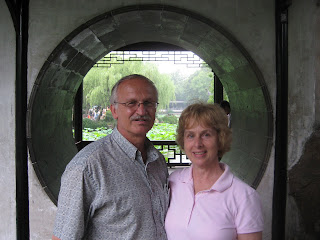 stayed at a nearby hotel and took a short trip to Hong Kong. I had a great time showing them around my city before I relinquished tour guide duties and we all went to Xi'an for a few more wonderful days.
stayed at a nearby hotel and took a short trip to Hong Kong. I had a great time showing them around my city before I relinquished tour guide duties and we all went to Xi'an for a few more wonderful days.
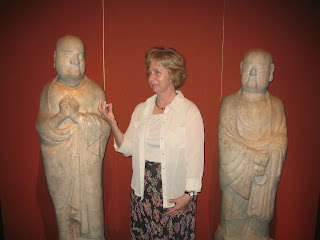 The best part naturally was just seeing them. I know they had a drastically different experience than the one they had 8 years ago in Beijing because this is not only a different city, but the last 8 years in China have been revolutionary (a positive Chinese revolution for a change!). My goal as tour guide was to show them a China not seen on tour groups, the small little dive restaurants that serve the best food, the back alley's with the giant markets. Hopefully they enjoyed their visit to Shanghai as much as I did.
The best part naturally was just seeing them. I know they had a drastically different experience than the one they had 8 years ago in Beijing because this is not only a different city, but the last 8 years in China have been revolutionary (a positive Chinese revolution for a change!). My goal as tour guide was to show them a China not seen on tour groups, the small little dive restaurants that serve the best food, the back alley's with the giant markets. Hopefully they enjoyed their visit to Shanghai as much as I did.
 stayed at a nearby hotel and took a short trip to Hong Kong. I had a great time showing them around my city before I relinquished tour guide duties and we all went to Xi'an for a few more wonderful days.
stayed at a nearby hotel and took a short trip to Hong Kong. I had a great time showing them around my city before I relinquished tour guide duties and we all went to Xi'an for a few more wonderful days.I really enjoyed seeing my parents reacting and remembering things I'd mentioned in emails and phone conversations while I showed them Shanghai. It may have rained the entire time, but transportation wasn't an issue as my mom discovered a taxi ride from one end of the city to the other costs no more than $4. Needless to say after an initial trip down the MagLev train and the subway, we used taxi's exclusively for the rest of their trip. My dad may have been most enamored with the food. The food isn't quite what we all are used to when we think of Chinese food, but at every meal my dad was like a kid in a candy store, making sure we left no food to waste. I brought them to noodle shops from all over China to dumpling restaurants and Cantonese style food, and my dad loved all of it - plus he could feed the family and get rounds of giant beer for everyone and it would cost less than $8.
Restaurants also provided the best chance for me to showcase my Chinese skills. My parents were appropriately awed by my pitifully few phrases which allowed me to steer taxis and order the 3 dishes I know the names of.
 The best part naturally was just seeing them. I know they had a drastically different experience than the one they had 8 years ago in Beijing because this is not only a different city, but the last 8 years in China have been revolutionary (a positive Chinese revolution for a change!). My goal as tour guide was to show them a China not seen on tour groups, the small little dive restaurants that serve the best food, the back alley's with the giant markets. Hopefully they enjoyed their visit to Shanghai as much as I did.
The best part naturally was just seeing them. I know they had a drastically different experience than the one they had 8 years ago in Beijing because this is not only a different city, but the last 8 years in China have been revolutionary (a positive Chinese revolution for a change!). My goal as tour guide was to show them a China not seen on tour groups, the small little dive restaurants that serve the best food, the back alley's with the giant markets. Hopefully they enjoyed their visit to Shanghai as much as I did.Old Folks in the Park
As my grandfather has attested to me throughout my life, keeping your mind and body healthy is essential to living a long, happy life. Which is why I support people of all ages exercising, even and especially the elderly. I hope to one day join the ranks of 'old folks', so rest assured I try to study and learn from my elders in all matters, including exercise. What I found in China however, may be a group of teachers I should better avoid.
When you think of older Chinese men and women I bet you imagine them waking up early and heading to the park for some Tai Chi. I'm sure many due, but none that I have seen. Instead the elder statesmen of the Middle Kingdom choose far more unique ways of exercising. My walk the other morning left me extremely puzzled about the exercise habits of the ageing Chinese.
I cannot list or remember all the 'characters' I saw on my walk through the park, but I can remember some of the highlights. There was the old man walking and clapping loudly in front and behind his body with each step. Then there was the stranger man walking backwards while clapping behind his back. The idea behind this sort of exercise is to work not only the body, but different parts of the mind (like the part that helps you walk backwards). While I fully support going for a walk (it's what I plan to do when I get up there), I question if this, uh, extra mental exertion really adds to the work out.
My old apartment had a little gym outside, the kind you might see on a school playground, but instead for adults. Every Saturday morning I would be woken to the sounds of old men grunting. Its not that they were working too hard, but that they felt the grunting helped them work out better. I watched them sometimes and the tasks weren't strenuous; they didn't require grunting. Yet I woke up to a small Asian Monica Seles every morning.
Each culture has its own sports for the old. In America we encourage walking, swimming and golf. In China its grunting and clapping. Perhaps we are not so different after all.
When you think of older Chinese men and women I bet you imagine them waking up early and heading to the park for some Tai Chi. I'm sure many due, but none that I have seen. Instead the elder statesmen of the Middle Kingdom choose far more unique ways of exercising. My walk the other morning left me extremely puzzled about the exercise habits of the ageing Chinese.
I cannot list or remember all the 'characters' I saw on my walk through the park, but I can remember some of the highlights. There was the old man walking and clapping loudly in front and behind his body with each step. Then there was the stranger man walking backwards while clapping behind his back. The idea behind this sort of exercise is to work not only the body, but different parts of the mind (like the part that helps you walk backwards). While I fully support going for a walk (it's what I plan to do when I get up there), I question if this, uh, extra mental exertion really adds to the work out.
My old apartment had a little gym outside, the kind you might see on a school playground, but instead for adults. Every Saturday morning I would be woken to the sounds of old men grunting. Its not that they were working too hard, but that they felt the grunting helped them work out better. I watched them sometimes and the tasks weren't strenuous; they didn't require grunting. Yet I woke up to a small Asian Monica Seles every morning.
Each culture has its own sports for the old. In America we encourage walking, swimming and golf. In China its grunting and clapping. Perhaps we are not so different after all.
Monday, July 7, 2008
Early Morning
Sometimes great things come from addictions, like when Franciscan monks liked to drink and eat bread too much and we ended up with sourdough. Or like on Saturday night when I stayed up until five in the morning watching 'The Office' (I couldn't stop, it was terrifying). Once I turned my computer off and though of getting some shut-eye I noticed how fantastic the sunrise was behind me over the city. The summer days are too hot to walk around during, but early morning was a perfect temperature for an adventurous stroll.
I strolled out of my apartment and over a bridge just as the city was waking up, or so I thought, but the city wasn't getting up, it had never slept. An army, literally dozens of uniformed blue city service workers were finishing their shifts. Biking along dragging their brooms, they had cleaned this filthy city, or at least tried to make a dent, during the late hours when the rest of us slept. I was surprised to see so much activity at such an early hour, even more impressive considering they were finishing their work.
As I continued to walk along I was surprised by how many stores were opened by five thirty. Not many percentage-wise, but impressive none the less. I found a produce market just opening, bags and bags of vegetables being unloaded into piles for their owners to claim and display. The fish sellers were just adding ice to empty pools of water, waiting for their fish and the butchers were getting a start on cutting up the animals.
The thought I couldn't escape on my walk was this isn't Europe, and there would be no fresh croissant for me. I tried a succulent smelling Chinese cart breakfast, but Chinese breakfasts remain utterly disappointing to me. In fact they're pretty gross. But perhaps that difference is what makes the experience really educational, a reminder that this isn't a culture I know, a reminder that despite living here for half a year I still know very little about the culture.
By the time I returned home, the buses were crowded and the men sleeping on the carts had woken and begun working on moving rubble around in an abandoned lot. It was six and I could tell the heat was coming, so I finally went to bed.
I strolled out of my apartment and over a bridge just as the city was waking up, or so I thought, but the city wasn't getting up, it had never slept. An army, literally dozens of uniformed blue city service workers were finishing their shifts. Biking along dragging their brooms, they had cleaned this filthy city, or at least tried to make a dent, during the late hours when the rest of us slept. I was surprised to see so much activity at such an early hour, even more impressive considering they were finishing their work.
As I continued to walk along I was surprised by how many stores were opened by five thirty. Not many percentage-wise, but impressive none the less. I found a produce market just opening, bags and bags of vegetables being unloaded into piles for their owners to claim and display. The fish sellers were just adding ice to empty pools of water, waiting for their fish and the butchers were getting a start on cutting up the animals.
The thought I couldn't escape on my walk was this isn't Europe, and there would be no fresh croissant for me. I tried a succulent smelling Chinese cart breakfast, but Chinese breakfasts remain utterly disappointing to me. In fact they're pretty gross. But perhaps that difference is what makes the experience really educational, a reminder that this isn't a culture I know, a reminder that despite living here for half a year I still know very little about the culture.
By the time I returned home, the buses were crowded and the men sleeping on the carts had woken and begun working on moving rubble around in an abandoned lot. It was six and I could tell the heat was coming, so I finally went to bed.
Sunday, July 6, 2008
Born on the 4th of July
Once every 7 or so years the stars and stripes align and the 4th of July falls on a Friday, leaving workers everywhere relieved to not need to worry about work the next day. For reasons I don't completely understand, the government of Shanghai doesn't recognise Independence Day, so everyone here had to work. 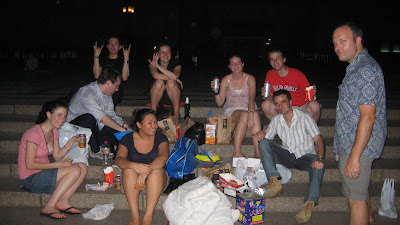 However we were determined to make the most of it after work, and we certainly celebrated with a bang.
However we were determined to make the most of it after work, and we certainly celebrated with a bang.
The great Chinese invention, fireworks, are banned within the city limits of Shanghai during the year. This came as a shocker to us all, but we were forewarned and had time to prepare a contingency - set them off and run if the cops come. With great difficulty some of my co-workers managed to procure a stash of fireworks and some sparklers for the kiddies.
A group of about 10 of us, mostly American, but with an Australian, Austrian, Brazilian and Brit mixed in, set off after work to celebrate the blessings of liberty with the most fitting tribute we could muster: McDonald's, Budweiser and Fireworks.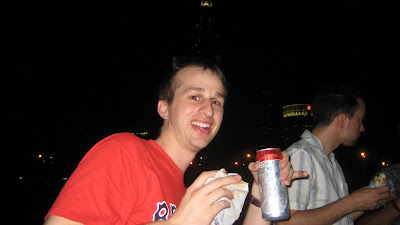 Just like everyone back home we had burgers, beer and lit things on fire - and what's more American than that? After eating and drinking on the steps of the famed Shanghai Museum, we ducked around the side of the museum to set off a small pyrotechnic display to the Tom Petty, John Mellencamp and the National Anthem. We didn't even have to run, just enjoy the brightly colored fountains of flame. To tell the truth, I had a ton of fun and we didn't get arrested. That makes for yet another great 4th of July.
Just like everyone back home we had burgers, beer and lit things on fire - and what's more American than that? After eating and drinking on the steps of the famed Shanghai Museum, we ducked around the side of the museum to set off a small pyrotechnic display to the Tom Petty, John Mellencamp and the National Anthem. We didn't even have to run, just enjoy the brightly colored fountains of flame. To tell the truth, I had a ton of fun and we didn't get arrested. That makes for yet another great 4th of July.
 However we were determined to make the most of it after work, and we certainly celebrated with a bang.
However we were determined to make the most of it after work, and we certainly celebrated with a bang.The great Chinese invention, fireworks, are banned within the city limits of Shanghai during the year. This came as a shocker to us all, but we were forewarned and had time to prepare a contingency - set them off and run if the cops come. With great difficulty some of my co-workers managed to procure a stash of fireworks and some sparklers for the kiddies.
A group of about 10 of us, mostly American, but with an Australian, Austrian, Brazilian and Brit mixed in, set off after work to celebrate the blessings of liberty with the most fitting tribute we could muster: McDonald's, Budweiser and Fireworks.
 Just like everyone back home we had burgers, beer and lit things on fire - and what's more American than that? After eating and drinking on the steps of the famed Shanghai Museum, we ducked around the side of the museum to set off a small pyrotechnic display to the Tom Petty, John Mellencamp and the National Anthem. We didn't even have to run, just enjoy the brightly colored fountains of flame. To tell the truth, I had a ton of fun and we didn't get arrested. That makes for yet another great 4th of July.
Just like everyone back home we had burgers, beer and lit things on fire - and what's more American than that? After eating and drinking on the steps of the famed Shanghai Museum, we ducked around the side of the museum to set off a small pyrotechnic display to the Tom Petty, John Mellencamp and the National Anthem. We didn't even have to run, just enjoy the brightly colored fountains of flame. To tell the truth, I had a ton of fun and we didn't get arrested. That makes for yet another great 4th of July.
Wednesday, July 2, 2008
Business
At work there are two types of classes I teach: workshops and face to face lessons, both of which have their advantages and disadvantages. All told, I teach 25 hours per week, or five lessons per day, with the other 4 hours devoted to lunch, placement tests and surfing the Internet. Admittedly a chuck of that time is supposed to be for talking to students in a casual setting (not like office hours at university, more like 2 friends hanging out), but teachers aren't required to, just encouraged and after a while repeating the same simple conversations grows tiresome and I seek refuge in the teachers lounge.
The face to face lessons are set in a small room and contain anywhere between 1 and 4 students of equal ability. The general idea is for the students to really have a chance to talk and converse with a native English speaker. We have a power point presentation with slides to direct the topics, usually teaching grammar, vocabulary or language. These lessons can be tedious if the students don't talk, but great if the student's ability and willingness are high. Of course when there are only 4 people booked, there is the chance that nobody shows up at all, which is the best.
The workshop classes are anywhere between 1 and 25 students, and can be of any mix of levels. The lessons focus on academic subjects (like grammar), cultural subjects, or business subjects. I usually teach the business lessons, partly because of the schedule and partly because somehow I have more business experience than almost anyone else at my office. Though the students clearly prefer the cultural lessons to my business ones (who doesn't like talking about birthday parties, and who does like talking about stock options?). Fortunately these lessons are usually very successful and I enjoy teaching them because its almost like putting on a show. The students sit and listen and interact with each other when I tell them too, but I also get to prance around in front of them, telling stupid jokes which they actually laugh at! Nothing like an eager captive audience.
The lessons and power points are all written by 'the people upstairs' or something like that. They actually let me write one once, which went alright. They don't let us change them, so the content stays the same everywhere in China, or so they say. I guess it makes life easier, not needing to 'really' prepare, just needing to read the lesson plan and present accordingly, but sometimes it would be nice to be given a little more leeway when it comes to teaching. All and all, I have enjoyed teaching and though I doubt it will be my life's profession, I would like to return to it at some point when I'm older.
The face to face lessons are set in a small room and contain anywhere between 1 and 4 students of equal ability. The general idea is for the students to really have a chance to talk and converse with a native English speaker. We have a power point presentation with slides to direct the topics, usually teaching grammar, vocabulary or language. These lessons can be tedious if the students don't talk, but great if the student's ability and willingness are high. Of course when there are only 4 people booked, there is the chance that nobody shows up at all, which is the best.
The workshop classes are anywhere between 1 and 25 students, and can be of any mix of levels. The lessons focus on academic subjects (like grammar), cultural subjects, or business subjects. I usually teach the business lessons, partly because of the schedule and partly because somehow I have more business experience than almost anyone else at my office. Though the students clearly prefer the cultural lessons to my business ones (who doesn't like talking about birthday parties, and who does like talking about stock options?). Fortunately these lessons are usually very successful and I enjoy teaching them because its almost like putting on a show. The students sit and listen and interact with each other when I tell them too, but I also get to prance around in front of them, telling stupid jokes which they actually laugh at! Nothing like an eager captive audience.
The lessons and power points are all written by 'the people upstairs' or something like that. They actually let me write one once, which went alright. They don't let us change them, so the content stays the same everywhere in China, or so they say. I guess it makes life easier, not needing to 'really' prepare, just needing to read the lesson plan and present accordingly, but sometimes it would be nice to be given a little more leeway when it comes to teaching. All and all, I have enjoyed teaching and though I doubt it will be my life's profession, I would like to return to it at some point when I'm older.
Subscribe to:
Posts (Atom)